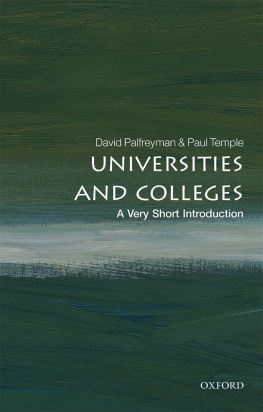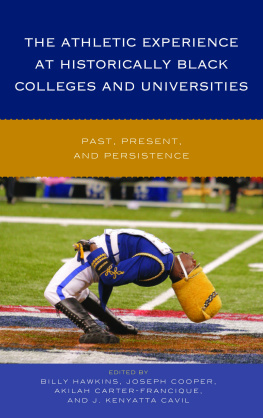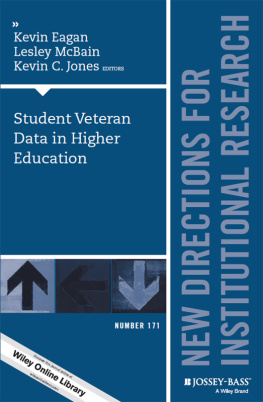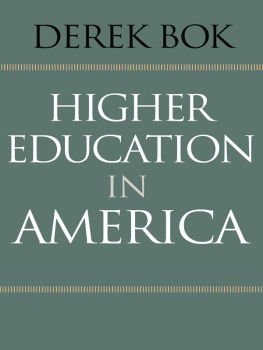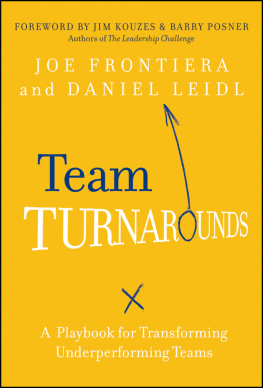ABOUT THE
CONTRIBUTORS
T errence MacTaggart is the principal author of this volume. Jerry Berberet, Adrian Tinsley, and Michael Townsley wrote individual chapters on their areas of expertise, while Buzz Shaw offers advice to new presidents. Tom Longin and Charles Cook contributed significantly to the thinking about turnarounds presented here and to some of the research on specific turnaround institutions.
TERRENCE MACTAGGART has conceptualized and edited two books on governance and transformation at public institutions: Restructuring Higher Education: What Works and What Doesnt in Reorganizing Governing Systems, and Seeking Excellence Through Independence: Liberating Colleges and Universities from Excessive Regulation, both published by Jossey-Bass. He has also led institutional turnarounds. While chancellor at the University of WisconsinSuperior from 1987 to 1991, he orchestrated a revitalization effort that resulted in improved state funding, growth in enrollment, and in The Superior Plan, an academic reform effort.
As head of the University of Maine System from 1996 to 2001, he was responsible for increased state funding for higher education, and he developed a governance model known as entrepreneurial universities-efficient systems. During that period, he led several successful statewide efforts to secure voter approval to make more capital investment in Maines public universities. In 2006, the trustees of the University of Maine System asked him to again serve as chancellor for a one-year term to focus on further improving state support.
MacTaggart also serves as a consultant to trustees and presidents of public and independent institutions on topics of governance and strategic improvement.
JERRY BERBERET served as the founding executive director of the Associated New American Colleges (ANAC) from 1995 to 2006. Prior to that he was a founding member of a study group of chief academic officers that organized in 1990 to analyze the essential identity and differentiating characteristics of small to midsize private comprehensive colleges and universities, an inquiry that led to creation of ANAC. Earlier, he was an associate professor of history and director of environmental science at SUNYPlattsburgh; dean of liberal arts at Willamette University, in Oregon; and vice president for academic affairs at North Central College, in Illinois. He has collaborated with the Carnegie Foundation for the Advancement of Teaching, the University of North Carolina, and the University of Minnesota in national surveys of the professoriate at various stages of faculty careers. His most recent book (with Linda McMillin) is A New Academic Compact: Revisioning the Relationship between Faculty and Their Institutions, published by Anker Publishing Company in 2002. He holds a PhD in American history.
CHARLES COOK served for 24 years as the director of the Commission on Institutions of Higher Education, which accredits all private and public colleges and universities in the six New England states. Currently he is senior vice president for university affairs for Johnson & Wales University, where his portfolio includes strengthening both institution-wide governance and quality assurance. He is a trustee of Lesley University, in Cambridge, Massachusetts, and the American College of Greece, in Athens. Cook has taught as an adjunct instructor at the University of Maryland, DePaul University, and Harvard University.
TOM LONGIN, formerly chief academic officer at Seattle University and Ithaca College, and recently retired vice president at the Association of Governing Boards of Colleges and Universities, has an intimate knowledge of the roles of presidents and trustees in leading turnarounds. He has done board workshops and professional presentations on the responsibilities of governing boards, institutional governance, the board and institutional planning, and strategic leadership in academic affairs. Longin has also authored an extended essay, Institutional Governance: A Call for Collaborative Decision-Making, in The New Academic Compact: Revisioning the Relationship between Faculty and Their Institutions, published by Anker Publishing Company in 2002, and frequently consults with independent institutions on the leadership responsibilities of trustees, presidential selection, governance and academic affairs, and governance and strategic planning.
KENNETH A. BUZZ SHAW is the former chancellor of Syracuse University and was previously president of the University of Wisconsin System. He has also served as chancellor of the Southern Illinois University System, president of Southern Illinois University at Edwardsville, and vice president and dean of Towson University, in Maryland.
At Syracuse, Shaw directed an extensive restructuring process and initiated the transformational change that led Syracuse to redefine itself as a leading student-centered research university. He is a former chair of the board of trustees of the Commission on Independent Colleges and Universities and a member of the board of directors of the American Council on Education. His most recent books are The Successful President: Buzzwords on Leadership, published by the American Council on Education/Oryx Press, and Intentional Leadership, published by Syracuse University Press.
ADRIAN TINSLEY led a turnaround in funding, facilities, and academic programs during her 13 years as president of Bridgewater State College, in Massachusetts. Since leaving the presidency in June 2002, Tinsley has served as a visiting scholar with the Harvard Graduate School of Education and as president-in-residence for Harvards masters degree program in higher education. She has also taught a leadership seminar at the University of MassachusettsBoston. Tinsley is a founding faculty member of the Bryn Mawr Institute for Women in Higher Education, held every summer at Bryn Mawr College since 1975.
MICHAEL T. TOWNSLEY, formerly president of the Pennsylvania Institute of Technology and senior vice president for finance and administration at Wilmington College, is currently a professor of business at Becker College. in Worcester, Massachusetts. He also consults widely with independent colleges on financial management and strategy. He is the author of The Financial Toolbox for Colleges and Universities and The Small College Guide to Financial Heath: Beating the Odds, both published by the National Association of College and University Business Officers.
ACKNOWLEDGMENTS
T his book is better than it might have been thanks to the work of many thoughtful people. The contributing authors, Jerry Berberet, Kenneth Shaw, Adrian Tinsley, and Michael Townsley, added depth that could not have been found from others. As head of the Associated New American Colleges, Jerry Berberet participated in one of the great turnaround dramas in the modern history of American higher education. Kenneth Shaw is widely recognized not only for restoring strength to Syracuse University, one of the nations finest research institutions, but also for his practical reflections on leadership as an author and mentor. Adrian Tinsley has inspired a generation of leaders through her transformational work at Bridgewater State College and her leadership of the Bryn Mawr Institute for Women in Higher Education. Michael Townsley, the former president of the Pennsylvania Institute of Technology, is a national expert on restoring financial health to small colleges. It is hard to imagine a more suitable array of contributors to a book on this topic.
The book benefited from the skill of two wonderful editors. Susan Slesinger of ACE/Praeger provided timely, correctand sometimes tartadvice when it was needed most. Anne Ruffner Edwards, who worked with me in Maine, has a background in public policy and a concern for clear, interesting prose, both of which contributed mightily to the readability of this text.



